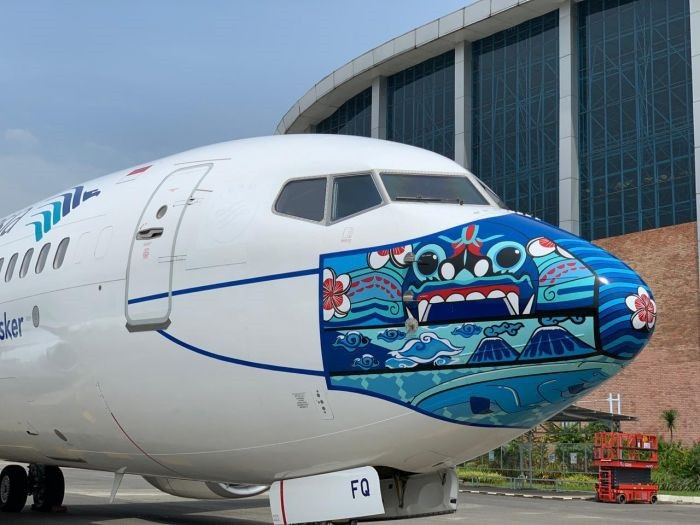Another chapter in saving Garuda: Lessons from the AerCap deal
In the majority of aircraft lease agreements, monthly rent payments are obligatory, regardless of the circumstances.
Change Size

Garuda Indonesia has finally sealed a deal with AerCap, one of the largest global aircraft leasing companies, by signing a global side letter on July 28. This will eventually dismiss a bankruptcy lawsuit filed against Garuda by AerCap at the New South Wales Supreme Court.
The deal will oblige the national flag carrier to relocate nine leased Boeing 737-800NG aircraft to approved routes. Going forward, this will be a major breakthrough for Garuda in renegotiating the complicated and tough agreements on current aircraft leases with other lessors.
Garuda’s fleet is shrinking and will keep decreasing in the near future. Reports say that the flag carrier is operating only about 40 aircraft out of the 142 in its fleet. As of June, these 142 aircraft were being leased from 34 lessors around the world, showing the huge task that Garuda faces to bring its fleet to the required size of just below 70.
Travel restrictions and passenger health concerns have contributed the most to the extremely low demand for air travel.
Throughout 2021, Garuda’s fleet operation struggles have been exposed. If we recall previous occasions, the airline suffered from the alleged involvement of Bombardier CRJ1000 aircraft operations in a bribery case involving former executives. The State Owned Enterprises Ministry has emphasized that it is trying to return the aircraft to Nordic Aviation Capital, the lessor, ahead of its lease term to avoid further losses. However, there has been no indication that any decisive solution has been reached.
Garuda Indonesia CEO Irfan Setiaputra said in May that the company would have to go through a comprehensive and total restructuring. The airline would have to gradually cut its fleet from 142 to no more than 40 and shift its business focus to the domestic market. By June, the airline had agreed to send two Boeing 737-800NG aircraft back to lessors. Recently, Garuda filed for a suspension of debt settlement obligations.
The settlement with AerCap to relocate nine aircraft to approved routes is arguably the best solution at the moment. Several common measures for the renegotiation of aircraft lease payments have emerged during the pandemic.
The first is to make payments in what is known as a “power-by-the-hour” arrangement. In this method, the airline pays the lessor based on how many hours the leased aircraft has flown in a month.
The second possible measure is extending the term of the lease. The success of this option depends on whether the airline is still in operation by the end of the lease. This option is safer for state-owned airlines. Under this arrangement, the lessor receives income from the airline throughout the extended lease period.
However, these scenarios can only succeed if the aircraft is actually used. The problem with Garuda, as well as other airlines, is that most of the planes are not actually flying as a result of the extremely low demand for travel.
Making things worse, under most of the aircraft leasing agreements, the payment of monthly rent is obligatory regardless of the circumstances. Lessors are entitled not to entertain any excuses from airlines.
In addition, most agreements lack a force majeure clause. This is generally because the agreements operate under British law, where force majeure is not a general legal concept. The jurisdiction is often chosen by lessors, who have the upper hand in many lease agreements.
Things are not as simple as just returning the aircraft to the lessor. Like in renting a car, when a plane is returned to the owner, it must meet the exact conditions the owner has set. In some cases, if you want to return a car early, you have to pay a penalty stipulated in the agreement. This also applies, broadly speaking, to aircraft leases, but they are bound by more technical considerations. Garuda has to ensure that all the planes it returns to lessors meet contractual requirements.
During these hard times, the size of the Garuda Indonesia fleet should match the demand for air travel. Downsizing it to below 70 planes does not mean the airline is going bankrupt.
At the end of the day, the airline business is about the ability to keep operations flexible to catch the slightest opportunity in the market. The recent step with AerCap will enable Garuda to shift its focus to the other issues, one of the most important ones being holding on to their employees.
The pandemic has also provided lessons for pilots, flight attendants and technicians in choosing their licenses and ratings. Because the aviation industry will depend mainly on domestic travel until the pandemic is under full control, narrow-bodied aircraft such as the Boeing 737 and Airbus 320 series will be the most useful. The wide-bodied family, such as the Airbus 330 and Boeing 777 series will have to wait.
In the future, Garuda could have a better deal by appointing fewer lessors but with more aircraft leases. Good corporate governance should prevail.
***
Ridha Aditya Nugraha is a lecturer in air and space law studies for the international business law program at University of Prasetiya Mulya. Andika Immanuel Simatupang is an associate at Nurjadin Sumono Mulyadi & Partners. The views expressed are their own.









